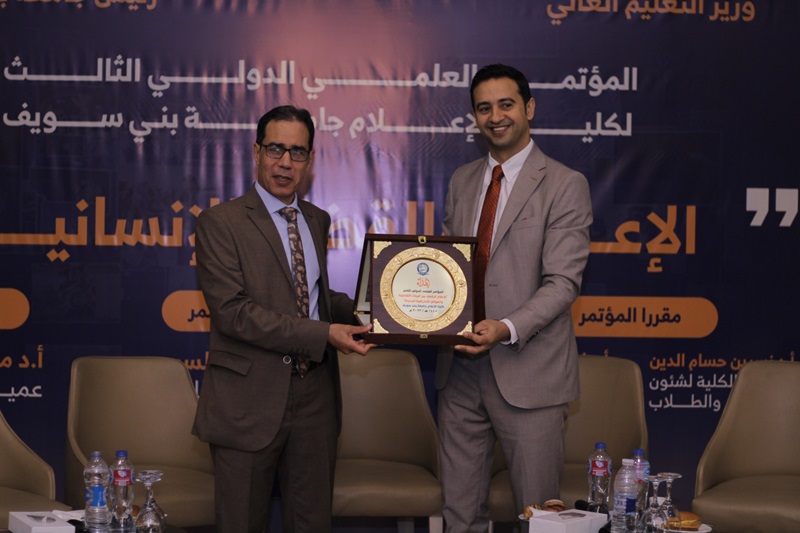Faculty of Mass Communication at Beni-Suef University Announces the Recommendations of the 3rd International Conference on "Media and Humanitarian Issues"

9 Jul 2025
Media Center
Under the patronage of Professor Mansour Hassan, President of Beni-Suef University, the Faculty of Mass Communication has announced the recommendations of its Third International Conference, held under the title "Media and Humanitarian Issues." The conference took place at the Holiday Inn Hotel on the Maadi Corniche in Cairo, with the participation of a distinguished group of media scholars and researchers from academic and media institutions both inside and outside Egypt.
The conference was organized in response to the rapidly evolving landscape of Arab and international media, and under the patronage of Professor Ayman Ashour, Minister of Higher Education and Scientific Research. It was chaired by Professor Mamdouh Abdullah Makawy, Dean of the Faculty, with Professor Abdel Aziz El-Sayed, former Dean of the Faculty, serving as Secretary-General of the conference.
The event focused on seven core themes exploring the relationship between media and humanitarian issues from various perspectives:
-
Media and human rights
-
Media and humanitarian relief
-
Media and conflict and crises
-
Media and refugee issues
-
Digital media in support of humanitarian causes
-
Media, women, and children
-
Media ethics and responsibilities in addressing humanitarian issues
Key Conference Recommendations:
I. On the Professional Level:
-
Recognizing humanitarian issues as a public sphere for media practice that can benefit from a digital monitoring and evaluation system to model and improve professional standards.
-
Enhancing content distribution channels by shifting from traditional coverage to interactive media treatments using emerging technologies such as augmented reality.
-
Developing more effective mechanisms to combat false digital content related to humanitarian issues, especially during crises.
-
Establishing a media observatory to monitor the social and psychological effects of media coverage on humanitarian issues across Arab societies in various economic, social, and political contexts.
-
Increasing the integration of AI-driven journalism ("robot journalism") to address humanitarian concerns both within the Arab world and globally.
-
Redefining media codes of ethics and professional guidelines in Egypt and the Arab region to more effectively integrate ethical considerations related to humanitarian issues.
-
Developing strategic goals for dramatic productions that address humanitarian themes in Egyptian and Arab societies, based on current socio-economic realities.
-
Wisely adapting and localizing international experiences in humanitarian-themed drama to better suit the Arab cultural context and increase their effectiveness.
II. On the Academic and Research Level:
-
Positioning humanitarian issues as a unifying framework that bridges academic media research and practical media operations, enabling accurate monitoring, evaluation, and informed guidance for future practices.
-
Focusing more on emerging psychological and social concepts linked to humanitarian concerns, such as:
-
Creating new media formats to address humanitarian topics using technologies such as 360-degree video for journalism and cross-media production for television, enhancing realism and credibility.
-
Expanding research into the environments of media coverage in conflict and war zones, exploring their components and impacts on the communication process and media professionals, from both theoretical and practical perspectives.
III. On the Institutional Level:
-
Training media professionals in Egypt and the Arab world on cutting-edge digital technologies for effectively covering humanitarian issues.
-
Enhancing the technical infrastructure of Egyptian media institutions to enable comprehensive coverage of humanitarian issues.
-
Preparing both public and private media organizations to address future competitive challenges in humanitarian reporting.
-
Establishing joint Arab media entities (governmental and private) that pool regional efforts and resources to promote peaceful coexistence, combat refugee-related hate speech, and foster values of citizenship.
-
Encouraging media institutions to adopt digital policies and strategies that enhance the professionalism and regulation of humanitarian reporting in a rapidly evolving technological landscape.
-
Urging national media, diplomatic, and security institutions to anticipate future developments related to humanitarian issues and proactively address their potential impacts.
-
Promoting the use of digital and informational capital within media institutions to better report on humanitarian issues through new communication models shaped by technological revolutions.
-
Aligning humanitarian media coverage with the Egypt Vision 2030, directing media production and infrastructure development toward combating misinformation and enhancing public awareness.